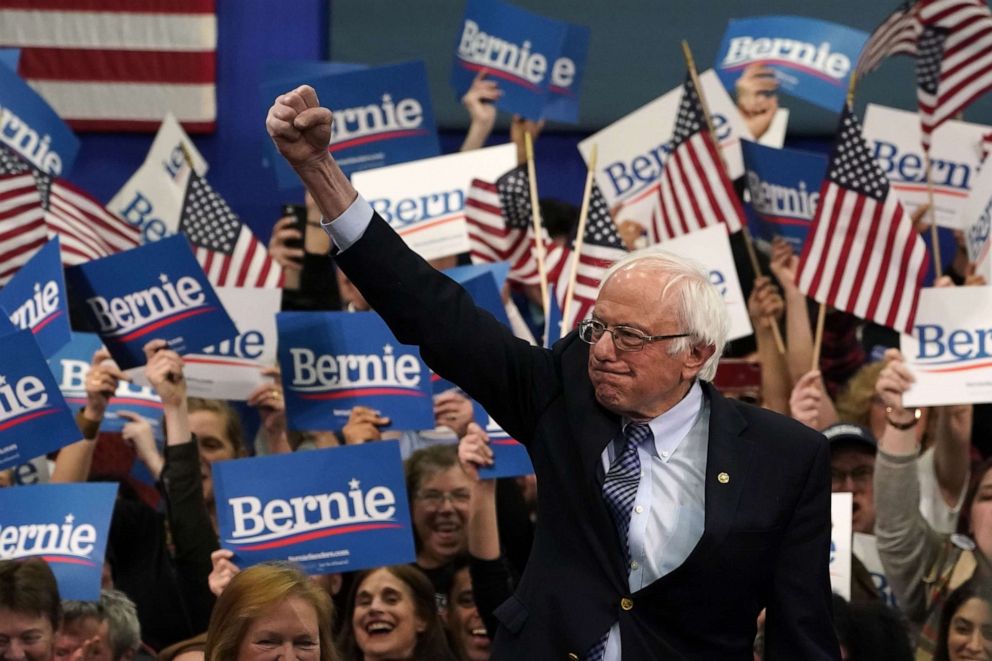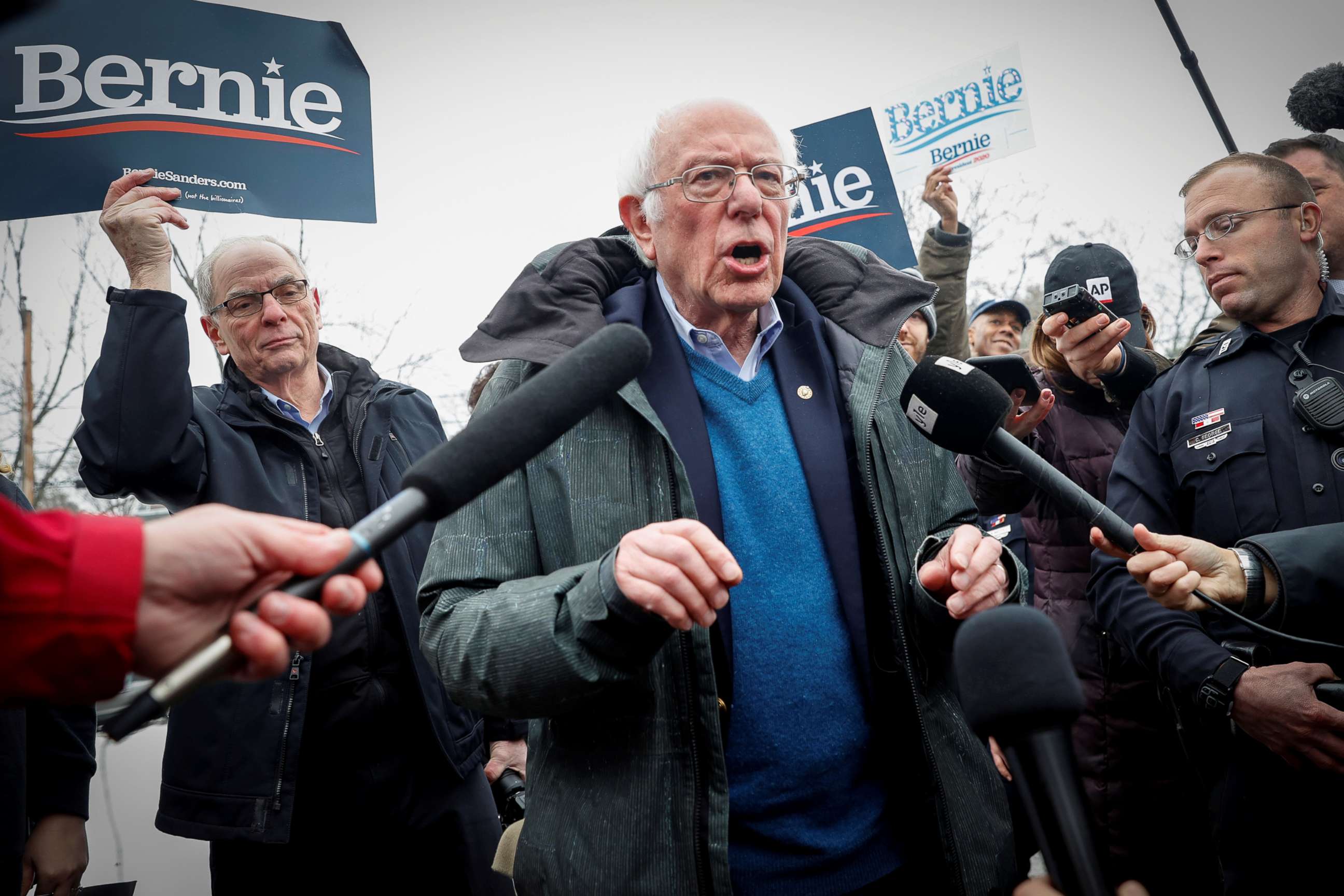Moderate Democrats worried about Sanders surge in 2020 field
There's concern his socialist proposals could turn off independent voters.
The strong showing by Vermont Sen. Bernie Sanders in the Iowa caucuses and New Hampshire primary has moderate Democrats on Capitol Hill concerned that, if the self-described democratic socialist wins the party’s presidential nomination, it could jeopardize efforts to protect their House majority and take control of the Senate.
Sanders and his allies, however, believe his campaign will spur voter turnout, helping Democrats in local and statewide races across the country.
But in interviews and private conversations with roughly a dozen House Democrats across the political spectrum, many told ABC News they feared that Sanders and his proposals, including Medicare-for-All, the Green New Deal and tuition-free college, could alienate independent voters in the suburbs and exurbs who helped deliver the House majority to Democrats in 2018.

It's a warning repeated by Sanders' opponents, including former Vice President Joe Biden and former South Bend, Indiana, Mayor Pete Buttigieg.
"They're terrified," Rep. Don Beyer, D-Va., the first House Democrat to endorse Buttigieg, told ABC News of his colleagues' response to Sanders' rise. "Very few people see Bernie as electable."
Sanders, along with Buttigieg, has emerged as a leader in the Democratic presidential primary after a neck-and-neck finish in Iowa. He edged out the former South Bend mayor in the New Hampshire primary on Tuesday, with 25.7% of the vote, compared to Buttigieg's 24.4 %.
"It could be challenging in parts of the country that we have to win in order to win the presidency and win a majority in the Senate," Sen. Michael Bennet, D-Colo., a centrist who dropped his own White House bid after the New Hampshire primary, said Thursday of a Sanders' nomination.
Rep. Anthony Brindisi, a New York Democrat fighting for reelection in a district carried by Trump in 2016, wouldn't commit to supporting Sanders if he becomes the party's nominee for president.
"He won't be the party's nominee," he said Thursday when repeatedly asked if he'd support Sanders in the general election. "I've made it clear that I think we should nominate a more moderate candidate who has the ability to reach across the aisle and get things done."
Republicans, who control the Senate, and need to flip nearly 20 seats to take back the House, have wasted no time playing up Sanders' front-runner status.
"This is not the Democratic Party we know of the past," House Minority Leader Kevin McCarthy, R-Calif., said Thursday. "This is a new socialist Democratic party. And those aren't my words. That's what AOC [Rep. Alexandria Ocasio-Cortez, D-N.Y.] calls herself. Same as Bernie Sanders, and that's probably where they're going to end up in the nomination."

Sanders has been endorsed by eight congressional Democrats – including progressive stars like Ocasio-Cortez and Rep. Ilhan Omar, D-Minn., who have campaigned for him, and Sen. Pat Leahy, D-Vt.
None of the roughly 40 House Democrats considered to be the most vulnerable in November have endorsed Sanders, according to FiveThirtyEight. Of those who have endorsed a presidential candidate, most have backed either Biden or former New York City mayor Mike Bloomberg.
Steve Israel, a former New York congressman who led the Democratic Congressional Campaign Committee, argued that the presidential race would be won or lost in seven battleground states, across dozens of swing counties and congressional districts in those regions that went for both Barack Obama and Donald Trump in recent presidential elections.
"Trump is going to make this a referendum on whether you want to build on the economy we have, or junk it and turn to socialism," he said. "That does not play well for candidates in bellwether areas."
Rep. Elissa Slotkin, D-Mich., a freshman and former CIA analyst from the Detroit suburbs, said her constituents "want someone who can provide stability," and appeal a broad swath of voters.
"I don't know that I'm going to endorse," she added, when asked if she would back any of the nominees ahead of her state's primary in March. "I just don't think people wake up in the morning and say, 'Hmm, who does my congressperson want to vote for?'"
Rep. Ro Khanna, D-Calif., a key Sanders backer and national campaign co-chair, defended his strength in a general election matchup with Trump, and said the Vermont senator's candidacy would lead to "record turnout" in the general election "that's going to benefit everyone."
"What we're going to have is someone very, very strong at the top of the ticket driving extraordinary turnout, and every candidate will have the ability to tweak that message to shape to shape their districts," he said.
Sanders, "is not going to compromise his beliefs, he's been clear about what he believes," Khanna added. "But he's going to make an effort to unify this party to be a big coalition."
Some Democrats believe that concerns about Sanders are premature.
"We're going to wait and see how this unfolds," Rep. Ron Kind, D-Wis., who represents a district won by Trump in 2016. "We've still got a lot of primaries coming up, and some viable candidates I see that are running."
"It's too early to see who the nominee is going to be," said freshman Rep. Debbie Murcarsel-Powell, D-Fla.
Others point to the results in New Hampshire, suggesting that the voting indicates a lack of support for Sanders' progressive platform: Buttigieg, third-place finisher Sen. Amy Klobuchar, D-Minn., and Biden, who finished in fourth place, garnered a combined 52 percent of the vote in the New Hampshire Democratic primary.
"This field is like a multiple-lane superhighway that is merging into two lanes," Israel, the former chair of House Democrats' campaign arm, told ABC News. "One is the far-left lane, the other lane is the pragmatic center-left lane. Right now, most Democrats prefer the candidates in that pragmatic lane."
ABC's Mariam Khan and Adam Kelsey contributed to this report.